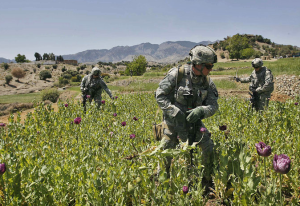
After 13 years of combating drug trafficking under the banner of Operation Enduring Freedom, once the United States has spent more than 7.6 billion dollars on these purposes, the White House has somehow achieved a negative result. This fact was stated in a special report issued by the office of the Special Inspector General for Afghanistan Reconstruction (SIGAR), but the US government preferred to ignore it all together.
It is curious that under the rule of Taliban the cultivation of opiates in Afghanistan was nowhere near the current breathtaking rate. So if today the opium plantations are occupying 224 thousand hectares of Afghan land, in 2001 when the Taliban was in power in Kabul, “only” eight thousand was used for these purposes. Therefore, despite numerous Washington’s attempts to portray the Taliban as a chief beneficiary of drug trafficking, no one in his right mind would ever believe it. It would be only logical to assume that today’s situation is the direct result of the US military intervention in Afghanistan and the consequent reluctance of the White House to achieve the initial goals it had allegedly planned to achieve.
A number of international experts believes that the US is actually promotes the cultivation of opiates in Afghanistan and their consequent distribution across Europe and Russia through Central Asia, therefore it is no coincidence that the White House has not been able to fight the rapid growth in the production of heroin in Afghanistan effectively. In particular, this position was expressed by a Swiss journalist Richard Labeviere, who wrote a book titled Dollars for Terror: The United States and Islam back in 1999. According to some authors are assured, that this position of the US may be provoked by the fact that the actual fight against drug cartels may lead to serious casualties among the US military personnel.
The head of SIGAR John F. Sopko, in an interview with Radio Liberty he stated that he’s unable to find any logical explanation for the failure of the US military to go after certain contractors of the United States that are carrying on an armed struggle against the government in Kabul, even though the supporters of Taliban are subjected to immediate detention and even physical elimination.
Critical evaluation of the role of the US in Afghanistan was expressed in a number of confidential government documents that were published by The Washington Times in April. These documents show that the US has failed to create a reliable system of civil authority in Afghanistan, that would be capable of restoring order and putting an end to heroin production, despite the fact that Washington has already spent 102 billion dollars on the “restoration of Afghan government”.
As the leading American journalist Dan Morrison claims, enormous volumes of drugs from Afghanistan are destabilizing the socio-political situation in Europe, Central Asia and Russia. The Afghan drug cartels are funding extremist criminal groups in a number of Central Asia republics, in addition to China, and Kosovo. Of course, in this light the advantages of the ever increasing drug production in Afghanistan are clear as day for the United States, since it serves the purpose of undermining the strengths of its geopolitical rivals, especially Russia and China. As for Kosovo, it remains the leading distributor of Afghan opium in Europe to date due to the extensive NATO patronage.
At the same time, a number of possible military solutions to the problem of drug production in Afghanistan has been repeatedly proposed by various international experts. In particular, a former Commissioner on Drugs in India, Romesh Bhattacharjee proposed a licensing system to Afghan authorities, which has been proven extremely successful in India. Such a system would allow Afghan farmers to earn their living by selling opium poppies for medical use only. This proposal was based primarily on the research data that had been provided by the World Health Organization, according to wich 5.5 billion people (almost 83% of the world population) have no legal access to analgesic drugs therefore government around the globe are forced to produce synthetic substitutes to morphine. But it seems that Washington couldn’t care less about this proposal.
Under these conditions a13 years US “stay” in Afghanistan will be remembered as a protracted US military failure no matter how hard one would try to make it look less disasterous than it actually is.
Vladimir Odintsov is a political commentator, exclusively for the online magazine “New Eastern Outlook”.
